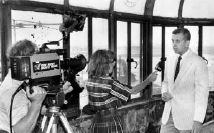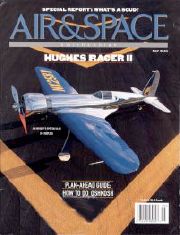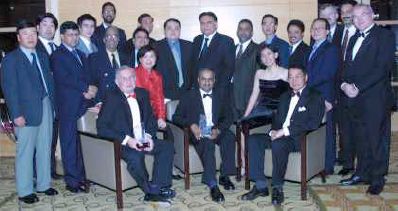|
You are currently
in the Archives section. Please be aware that some information and links
in the archived page may be outdated.
Click here
to return to the Archives' main page to see the list of archived articles.
|
A
R C H I V E S
 Author/essayist
and teacher, the great Joyce Maynard whose works include “To Die
For”, “At Home In The World”, regular columns for The New York Times,
and for National Public Radio’s “All Things Considered”, is pictured
at Scholastic Magazine’s 80th anniversary celebration with Florence
Arend. Author/essayist
and teacher, the great Joyce Maynard whose works include “To Die
For”, “At Home In The World”, regular columns for The New York Times,
and for National Public Radio’s “All Things Considered”, is pictured
at Scholastic Magazine’s 80th anniversary celebration with Florence
Arend.
Both women were recognized for their
creative power and excellence on April 29, 2003 in New York City.Perhaps
Joyce Maynard’s greatest contribution to aspiring writers is via
a series of creative encounters, the next of which will be a two-day
event at her Mill Valley, California home May 17-18, 2003. More
info: mailto:myrna@joycemaynard.com. |
  Smithsonian’s
Air & Space Magazine May 2003, pages 11 and 12 feature Air Cargo News
publisher Geoffrey Arend, whose first Newark book “Great Airports,
Newark International” (Books) and
other efforts saved historic Building One at Newark International
Airport. Pictured in 1981, in Building One’s control tower,as part
of an exhaustive campaign to save the building, Geoffrey is interviewed
by Trish DeGasperis of Public Television’s New Jersey Nightly News.
Smithsonian’s
Air & Space Magazine May 2003, pages 11 and 12 feature Air Cargo News
publisher Geoffrey Arend, whose first Newark book “Great Airports,
Newark International” (Books) and
other efforts saved historic Building One at Newark International
Airport. Pictured in 1981, in Building One’s control tower,as part
of an exhaustive campaign to save the building, Geoffrey is interviewed
by Trish DeGasperis of Public Television’s New Jersey Nightly News.
|
|
The
Great James Wilding
 James
Wilding
James
Wilding |
James
Wilding, the first and only director of the Metropolitan Washington
Airports Authority, retired May 2nd.
He will be succeeded by James Bennett,
the authority’s chief operating officer since 1996.
Mr. Wilding began as the agency’s
director in 1987, as operation of Ronald Reagan Washington National
Airport and Washington Dulles International Airport was privatized.
The Metropolitan Washington Airports
Authority (better known as Reagan National and Dulles Airports)
is an economic catalyst for Virginia, Maryland, and Washington,
D.C. Since its creation in 1987, the Authority has doubled its workforce,
expanded and improved facilities and more than quadrupled its operating
budget. It has changed from operating in the traditional role of
a facility manager to an active business role of shaping the aviation
system that serves the Metropolitan region. The passenger and air
cargo activity at Ronald Reagan Washington National and Washington
Dulles International Airports generates over 113,000 jobs that reflect
$2.3 billion in wages.
Mr. Wilding describes his effort as
strengthening the Authority’s ability to sustain its vital role
as an economic engine. He believes success depends on the ability
to 1) understand the larger issues facing any organization and 2)
develop performance management systems that support being competitive,
efficient, responsive and capable of meeting current and future
demands of all stakeholders including employees, customers, and
partners.
James Wilding built and worked through
partnerships to better understand what works, what doesn’t, and
what can be improved so that adding value was always the constant.
The Port Authority of New York & New
Jersey may be a bigger enterprise but Director of Aviation William
DeCota admires and is a big fan of James Wilding.
“A complete original—James Wilding
is an airport pioneer who blazed new trails, while never forgetting
to listen and be open to new ideas.
“James Wilding is an individual I
like to pattern my activities after.
He will be missed.”
|

All
of our friends were there. . . (seated from left) Peter Sedgley,
Noryate Abd Rahman -Singapore; R Ramprasad - Mumbai; Rusela Rubin
- Manila; Stephen Chu - Area Manager Singapore. (Standing from
left) H M Chung - GSA Korea; Kenji Akai - GSA Tokyo Japan; Qazi
Jared Karim - Dhaka; Michael Qu - Shanghai; Ravishankar Mirle
- Route Manager; Pradeep Suri - Delhi; Aniruth Songsatya - Bangkok;
Kenny Kao - GSA Taiwan; F.D Malik -Pakistan; Damian Jayosuriya
- Colombo; Bobby Chang - Kuala Lumpur; Tristan Indrawan - Jakarta;
Jacky Lau - Hong Kong; Glenn Baxter Melbourne; Anthony Goncalves
- Chennai; Keith Longstaff - Senior General Manager Commercial
Operations West Asia & Pacific Rim.
Emirates SkyCargo based at DXB wins
quite a few awards. But as they say on the street “not for nothing”
these people are actually very good at what they do. Lest someone
think that the high-flying carrier is taking these things for
granted, recently when EK SkyCargo won the Best Air Cargo Carrier-Middle
East award for the eighth year running, at Asia’s freight industry
Oscars, the full team of regional Emirates SkyCargo managers showed
up to celebrate. Emirates cargo managers from 15 online and offline
destinations in West Asia and the Pacific Rim met in Singapore
for their regular regional meeting. At the same time, the Asian
Freight and Supply Chain Awards (previously known as the Asian
Freight Industry Awards) took place in Singapore’s Fullerton Hotel.
Peter Sedgley, General Manager Cargo Commercial Operations, said:
“The AFSCAs are the Oscars of the Asian freight industry. We are
thrilled to have won this major accolade for eight years running.
In recent years, we have focused on playing a larger role in the
trade process and adding value to our customers’ business. This
award is a powerful spur to provide even better services.”
|
 Bill
Boesch
Bill
Boesch |
. . . Wings
and Wheels. A company that repairs airplane wheels and brakes has
landed a $12 million contract from Florida-based Spirit Airlines.
Messier-Bugatti-Tracer, formerly Tracer Repair & Overhaul
gets a five-year contract with Spirit , added to a five-year agreement
to repair wheels and brakes of C-17 military cargo aircraft
secured earlier this year. The Milwaukee company also said that
it has a one-year contract to do wheel and brake repairs for Zoom
Airlines, based in Ottawa, and it has been hired to do
similar work for a fleet of Boeing 727-200s operated by Kitty
Hawk Air Cargo. The Iraq War has boosted interest in the C-17
military work horse for possible commercial air cargo assignments.
The C-17 is seen by some in commercial air cargo as an alternative
for the Ruslan and other big Russian-built aircraft
as the only alternative to carrying very large outsize cargo in
the world today. That outsized market is currently worth about $250
million USD yearly according to industry sources. “Economies of
the C-17 overshadow any other aircraft currently in service,” said
Bill Boesch. “The problem has been high costs to purchase
(325 million) but the C-17s performance record has been flawless
which should raise some creative
thinking to get these aircraft into commercial service. Operationally
they take off and land almost on a dime in very small spaces. In
terms of economy, the efficient use of four engines and a small
crew as compared to the competition is a definite plus. Although
the aircraft are best known by most people for their role as troop
carriers for returning war heroes during the months ahead as the
C-17’s role expands in heavy schedules to the Middle East, what
these airplanes are made of will become apparent.” Meantime what
the C-17 needs, a creative marketing program was advanced a while
back, wherein an operator would utilize the aircraft as a cargo
arm of CRAF (Civil reserve Air Fleet) which would bring down
costs considerably and make the U.S. Government a partner.
Bottomline is, with only 90 C-17s currently in the air and the government
wanting at least a hundred more, now that the airplane has been
widely photographed and brought to the public’s attention as the
result of the adventure in Iraq, watch something happen soon . .
. US DOT sets public hearing to determine whether DHL
Airways, an affiliate of DHL Worldwide, is a U.S. citizen under
U.S. law. DOT previously carried out an informal review of DHL’s
ownership but will not put on the formal investigation dog and pony
show wanted by UPS and FedEx . . .
|
|
|
Night
Flight to Baghdad
Richard
Branson’s Virgin Atlantic puts cargo on page one worldwide, carrying
a full load of desperately needed relief supplies into Baghdad, May
4.
 Sir
Richard
Sir
Richard |
Virgin
also hopes to start flying into the country with regularly scheduled
service soon.
But once again there he was, the most
exciting and visible airline chief executive in the world, Sir Richard
Branson personally delivering humanitarian aid to Iraq on the first
civilian plane to land in the southern city of Basra since the war.
The Boeing 747 passenger was loaded
with cargo above and below decks with items buckled up into passenger
seats. Blood was met with bandages and other stuff, including critical
medical supplies, sheets and blankets that Sir Richard donated.
Sir Richard told reporters:
“Aid agencies do their part. We have
an airline and we can move quickly.
“If there is need for more, we will
be back,” he said.
Maybe Sir Richard’s flight is a publicity
coup for Virgin Atlantic, but whatever else you have heard, he is
the most exciting airline executive on the planet.
He is upfront about making it clear
that Virgin Atlantic wants to resume regular flights between Britain
and Iraq, suspended since 1990.
“We would be happy to start regular
flights to Baghdad, Virgin is ready and willing to do it,” he said.
Virgin has proposed three to four weekly
flights between Britain and Iraq along with separate planes carrying
aid.
For the record, during the Gulf War
a dozen years ago, Virgin flew several humanitarian flights into Iraq.
Pan Am’s Juan Trippe, TWA’s Charles
Lindbergh, Eastern Airlines’ Eddie Rickenbacker, the great Freddie
Laker come to mind when comparisons are made.
Sir Richard is a dreamer and a doer.
While others at his level are giving
back millions in personal benefits, as their companies go down the
tubes, here is the maverick airline guy from London flying whatever
airplane he could get his hands on, filled up to the top with Band-Aids,
iodine, and medicines paid for out of his own pocket for the beleaguered
people of Iraq.
When all others are dumping Hong Kong
because of SARS, Virgin Atlantic Airways will not be swayed, keeping
an aerial lifeline and confidence open to the city.
When Concorde is dumped by British Airways
after having cost UK taxpayers billions, Sir Richard steps up and
attempts to find a way to keep the great aircraft in service.
What it is about Richard Branson is,
that he is fresh, while everybody else is tired.
He makes an airline business that seems
to be all about confrontation and self-interest, once again, a bit
like what many of us thought we were doing, when we chose an aviation
career.
They ought to change the rules in England
and make this guy the King. |
|
Dr.
Otto Speaks
 Andreas
Otto
Andreas
Otto |
“The
airfreight business is facing immense challenges,” Dr. Andreas Otto,
Lufthansa Cargo Board Member Marketing and Sales said.
Dr. Otto said that the industry needs
more professionalism, especially from the cargo carriers.
Casting a self-critical look at the
carriers, Dr. Otto pointed out that airfreight is still all too
frequently seen as a source of additional earnings for the passenger
business and often has no special top-management focus.
Owing to the present, catastrophic
earnings situation and extremely high capital commitments, the carriers
are increasingly shedding their investment capability.
“In the door-to-door logistics chain,
the carriers are today shouldering more than 80 per cent of the
investment outlay,” he said.
At the same time, the forwarders have
secured an excellent position in the logistics chain and are operating
successfully even at times of crisis.
In the medium term, this imbalance
between forwarders and cargo carriers is threatening the development
of the entire transport industry.
“The current win-lose situation must
urgently evolve into a win-win partnership,” Dr. Otto added. To
that end, cooperation between both sides must be intensified on
a lasting basis, for example, in customer relationship management,
in ongoing process standardization and further advances in electronic
booking potential.
The core success factors, with which
the air cargo industry can safeguard its profitability, are above
all a clear focus on customer service, products and networks, central
pricing control and revenue management, and a pronounced profit-and-loss
responsibility. Modern IT systems and automated routine processes
are also essential for successful cargo carriers. Lufthansa Cargo
is well-poised strategically in that respect and strongly positioned
to expand its market and innovation lead.
Despite the present stagnation in the global
economy, Dr. Otto is in the medium term anticipating yearly growth
to average six per cent in the air cargo business.
|
 Colleen
C. Barrett
Colleen
C. Barrett |
Southwest
Airlines President Colleen Barrett says barring any terrorist
bad news, the airline business could begin rebounding soon. “We’ve
never been shy to jump in,” Ms. Barrett told a reporter. “If we
ended up in a position to add a few more planes, it would be a real
morale booster, a little spark. We like to spark.” The Dallas-based
airline which is now the USA’s sixth largest carrier and one of
the shining stars of this business right now, notched its 30th consecutive
annual profit last year. About the spate of new low-cost carriers
such as Delta’s new low-fare airline, Song; Continental
Lite; MetroJet by US Airways and Delta’s
own Delta Express, the chief executive notes: “You can’t
confuse your customers and your employees. You’re one thing or another,
not half one thing and half another thing. If you’re a 10-year Delta
(frequent flier) used to first-class seats, the food and service—I
think you’ll be let down.” Last year Southwest added 20 aircraft
and didn’t lay anybody off. Although the carrier expanded like crazy
prior to 9/11, no new cities have been added since October 2001
when Norfolk, Va. joined the system. In addition to being
president Colleen C. Barrett is currently Chief Operating Officer,
and Corporate Secretary for Southwest Airlines Co. She oversees
management, leadership, and budget responsibilities over operations;
customer service; corporate services; human resources and training.
She is also a member of the Company’s Board of Directors, as well
as a member of the Company’s Executive Planning Committee, and she
chairs numerous special teams, task forces, and committees relating
to internal and external Southwest Customers . . . According to
a leading industry group, the European airlines managed meager growth
this year. The Association of European Airlines (AEA) 30
members reported a 10.4% drop in passengers between March 31 and
April 6. Traffic on routes to the Middle East nosedived 45.5
per cent compared with the same week last year. Traffic on flights
to Europe declined 15 per cent, North America fell
by 7.7 per cent, flights to Asia were down 10.1 per cent.
“For the first ten weeks of the year, our market was growing,” said
AEA Secretary General Ulrich Schulte-Strathaus. “In just
four weeks that has been wiped out.” . . . A big Spring 2003 Auto
Show, that highlights the best and the brightest, held in Shanghai
recently closed three days early because of surging cases of SARS,
which has gripped Mainland China. Right now the Asian airlines
join the real world, as their business has completely tanked. SARS
has crippled the business of Cathay Pacific Airways, Qantas
Airways, Thai Airways and Singapore Airlines which
have all reduced capacity, and analysts have trimmed profit forecasts
as the outbreak of SARS worsens, biting into travel across the region.
Empty aircraft with as little as a dozen people on a widebody ex-Hong
Hong is no joke as the SARS situation has everybody running
for cover. Meantime Cathay Pacific said that it is rethinking
its dividend payout now that SARS has gutted air travel at the airline
that prestigious Barrons described as among the best airline
investments in the world less than two months ago. Cathay also appealed
for help, asking Hong Kong Airport Authority to lower landing
fees. According to a report, Cathay has about a billion dollars,
which has been thought enough to weather the downturn, although
others supposed the nearly $6 billion that American Airlines
had in cash two years ago, should have been plenty to see the world’s
biggest airline, through the past two turbulent years. Loss of trust
in American Airlines CEO Don Carty as the result of the inbedded
golden parachute guarantees for 45 executives at the airline, no
matter what the financial result, that were not revealed during
labor negotiations, was a terrible and unfortunate turn for the
worse, just when it looked like everything at American would turn
out OK. Don Carty resignation keeps in some shape and form, the
plan he and his team masterminded that was ratified by a now furious
AA labor force. Far as we know, Carty is a good guy and a brilliant
airline chief, who we think just forgot or misjudged how much the
sporty game rules changed when the great airline went on the financial
ropes. Carty in a way is like Macbeth—a victim, losing his job while
saving an airline. Like a lot of things that have happened recently
in our business, the Don Carty episode is a damn shame . . . Ryanair
CEO Michael O’Leary declares that the Irish carrier plans
to lower ticket prices by a further five per cent annually over
the next five years. The no-frills carrier said that it plans to
raise its passenger numbers to 30 million next year. So right now
on both sides of the “Pond” carriers that have something to shout
about, i.e. JetBlue, Southwest, Ryanair, Air Trans, in this
year of airline horror stories, seem to all be cut from the same
cloth, low cost (CSM) no frills, one airplane kind of companies.
Now when will any of these guys get into cargo? Southwest does move
some small stuff we hear. Air Tran being reluctant in cargo is understandable.
But by turning thumbs down to cargo, are these carriers missing
a potentially huge revenue stream, or are they sending the world
a message, that air cargo isn’t worth the effort? Your move . .
.

|
|
|

